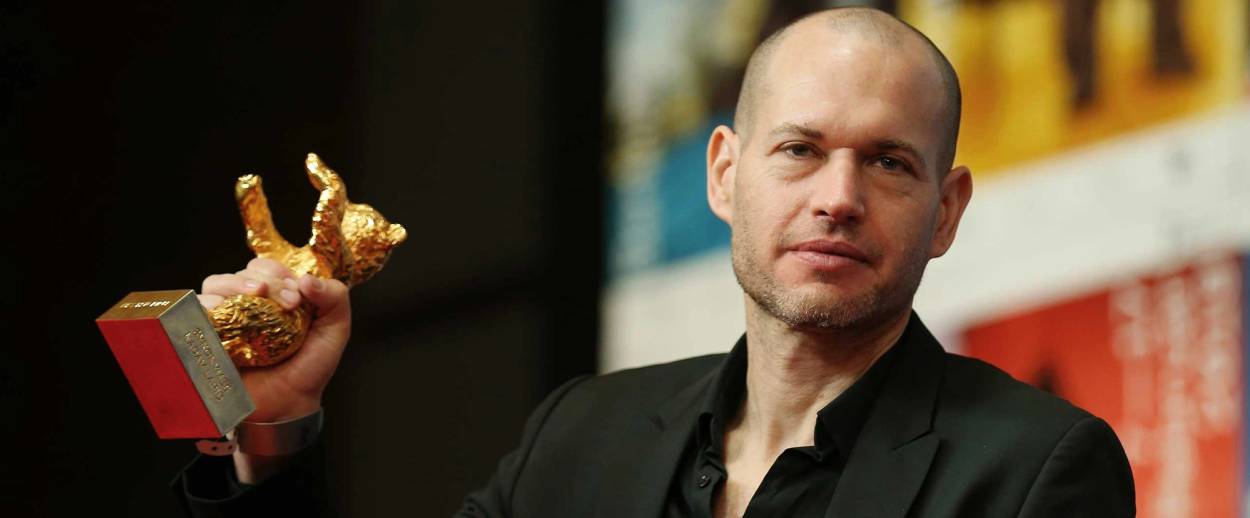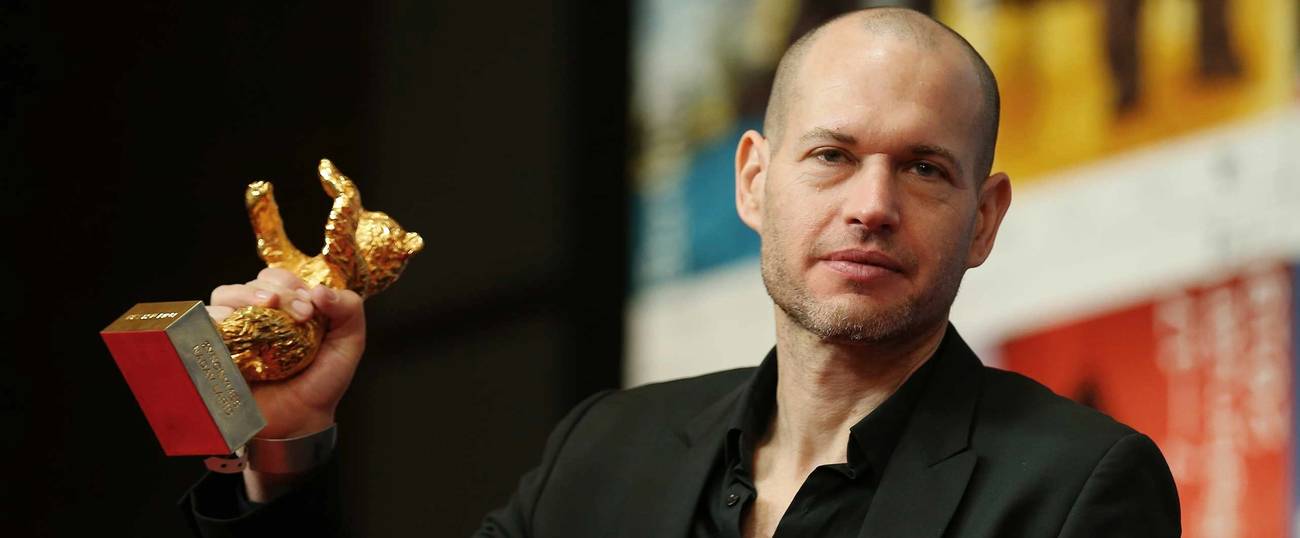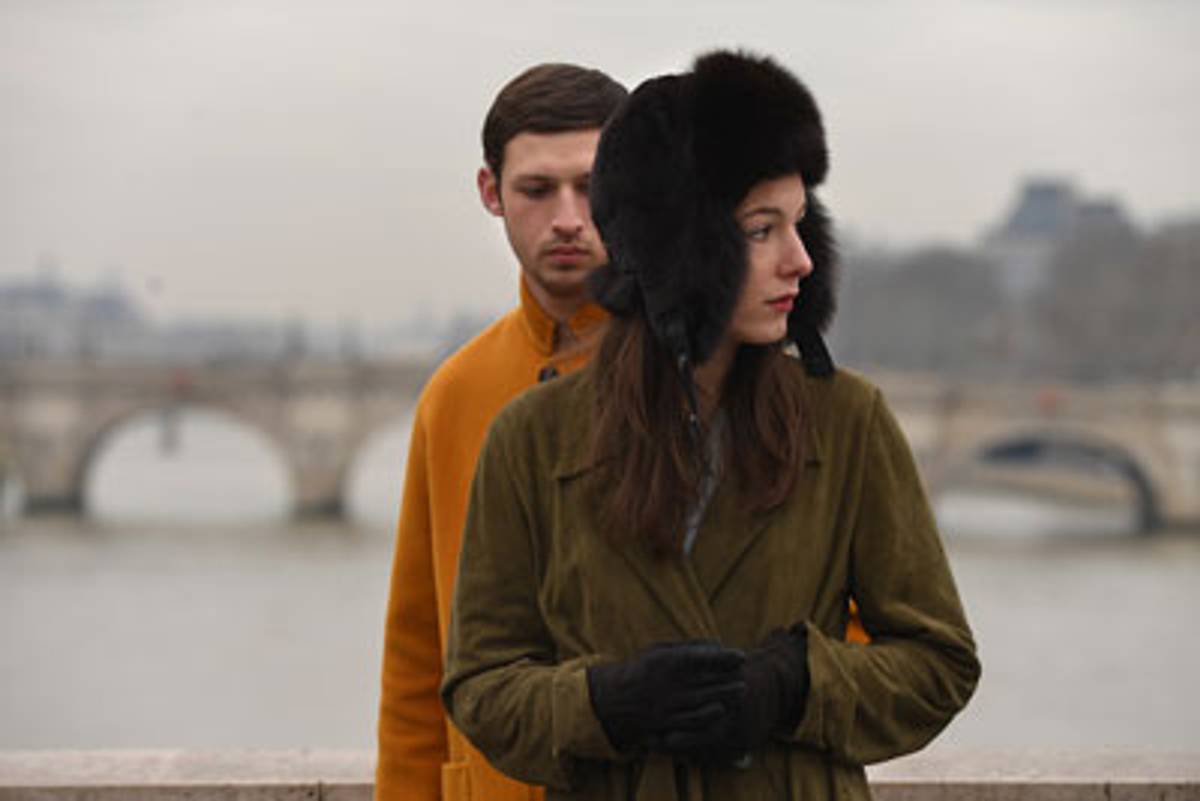A Golden Bear for Israel
The protagonist of ‘Synonyms’ refuses to speak Hebrew. Is that why director Nadav Lapid snagged the Jewish state’s first top prize in nearly 70 years of the Berlin Film Festival?




For the first time in the Berlinale’s nearly 70-year history, an Israeli film, Nadav Lapid’s Synonyms, has won the Golden Bear, the festival’s coveted top prize. A French-Israeli coproduction, Synonyms is an existential tragicomedy about Yoav, a young Israeli who moves to Paris and, with the help of little more than a pocket dictionary, sets out to become French. He repudiates the Hebrew language, insisting even on answering his Israeli friends, including his superiors at the Israeli Embassy where he is briefly employed, in French. He cuts off all ties with his family, refusing to meet with his father when he unexpectedly calls from Charles de Gaulle Airport. He befriends a fashionable, idle French couple who save him from freezing in an empty bathtub after his worldly possessions, including his clothing, are stolen from his Airbnb immediately after he arrives in Paris. Eventually Yoav marries one of them to gain citizenship.
Aside from this, Yoav lives in a squalid, almost certainly illegal rental, eats the bare minimum of pasta to survive, crashes parties for the food, and, in one shocking scene, poses naked and touches himself while speaking—or more accurately, shouting—Hebrew, at the insistence of a pushy pornographer. (Tom Mercier plays lead in an astonishing feature film debut.) Throughout the film, Yoav rattles off French vocabulary lists (the “synonyms” of the title) that acquire a poetic, almost incantatory quality. Like stream-of-consciousness, these words provide a window into Yoav’s mind, sparing the filmmaker, who cowrote the screenplay with his father Haim, the need for cumbersome explanation.
Lapid’s superb direction is fleet-footed and assured. Just as the film never spells out Yoav’s reasons for fleeing his Israeli past, the director is confident enough to let his measured and carefully calibrated film speak for itself. Synonyms can be ambiguous at times, and is perfectly content to revel in its mysteries.

Lapid will almost certainly be accused of having made an anti-Israel film, and specifically for having had the chutzpah to film the story of an Israeli (ex-IDF, no less) who flees to Paris at a time when many French Jews, fearing anti-Semitic attacks, are making aliyah. But such accusations miss the point of the film entirely. More than anything, Synonyms is a meditation on the hopes and perils of identity, assimilation, self-assertion, and self-reinvention. As such, the film is at once universal and intensely Jewish.
The evening before it won the Golden Bear, Synonyms, the first Israeli title to screen here in competition in eight years, was named the festival’s top film by the International Federation of Film Critics (FIPRESCI), a body that has a much better track record of singling out festival films for commendation than international juries. The double win is rare.
Certificate in hand, Lapid spoke to Tablet magazine about why he made Synonyms and his response to those who have accused him of being anti-Israeli: “It’s a harsh criticism of Israel, but a harsh criticism of Israel can only come from a strong attachment. I mean, you cannot hate someone or something you don’t care about,” the 43-year-old director explained.
“The second thing is that I’m not less Israeli than the characters that I criticize. So all these negative adjectives that Yoav uses about Israel,” he said, referring to a particularly colorful list of synonyms that include obscène and lamentable, “tell us about himself, but these are also things that I’m telling about myself. And you have the right to criticize yourself.”
In his previous feature, The Kindergarten Teacher (2014), about a gifted child who extemporizes poetry, Lapid delighted in the music inherent in the Hebrew language. Here, we follow Yoav’s passionate love affair with French. “He caresses it with his mouth,” Lapid said. “Yoav flirts with the French language. Words can signify things, but they also exist as music. Words are another beautiful element of being: the things we say and the sounds around us. I told the actor: In each two sentences find a word and fall in love with this word and be happy to articulate and celebrate this word.”
In the film, language is Yoav’s main utensil in his protracted project of self-transformation. Crucially he retains his conspicuously Hebrew name and hangs out with other Israelis, including one who walks through a crowded metro wearing a large white yarmulke, humming “Hatikvah” and getting up in passengers’ faces, clearly looking for a fight. (He doesn’t find one.) Much later in the film, Yoav is called on to sing his national anthem in his citizenship course and shouts out the lyrics ambivalently, with what seems to be a mix of rage and melancholy. Walking out of the film, we are left to wonder how successful Yoav’s dream of becoming French will ever be.
If the film is critical of Israel—implicitly, since none of that criticism is ever spelled out—Lapid does not spare his protagonist either. Indeed, with his unexplained francophilia and his single-minded determination to become French, Yoav seems shockingly naïve. “He’s a little like Voltaire’s Candide. He thinks that he ran away from the worst country on earth and arrived at paradise. He is running away from his identity, from his past,” Lapid explained. “But I think, in a way, his body contains his past. His body contains the fact that he is a Jew, and his body contains the fact that he’s done the army. In a way he wants to annihilate his body because his words are French, but his body remains Israeli, his body is Jewish. So he freezes his body to a symbolic death, and then he starves himself, and then he prostitutes himself, but the body is still there.” At the end of the film, Yoav remains branded as a Jew and as an Israeli. Self-metamorphosis has its limits.
***
All in all, this year’s festival was a lousy send off for Dieter Kosslick, whose 18-year reign as festival director has had its ups and downs. “He runs a film festival as if he is having a party in his living room,” director Paul Thomas Anderson said of Kosslick’s management style when There Will Be Blood had its international premiere here in 2008. Under Kosslick’s leadership, the Berlinale has expanded—this year there were around 400 films in nearly a dozen sections—and the audience has more than doubled. But while hundred of thousands of tickets continue to be sold each year, there have been plenty of naysayers.
In late 2017, an open letter signed by dozens of German film industry leaders, called for a fresh start to the festival following Kosslick’s departure in 2019. Many aspects of Kosslick’s festival management have come under attack, including a selection process that many have seen as favoring hot-button political and social topics over artistic quality.
In the best of years, the Berlinale has introduced audiences to many of the most widely discussed films of the moment, including the foreign film Oscar winners Asgar Farhadi’s A Separation and Sebastián Lelio’s A Fantastic Woman, and Wes Anderson’s Grand Budapest Hotel and Isle of Dogs. At the same time, the film festival that was born in 1951 as a tool of Cold War propaganda has retained its political urgency and the Berlinale has been a consistent champion for female filmmakers. During Kosslick’s time here, three women have snagged the Golden Bear, compared to zero female wins at either Cannes or Venice in that same period.
Yet aside from Synonyms, only four other Israeli films have made the main Competition during Kosslick’s tenure: Only one of them, Joseph Cedar’s Beaufort, which took home the best director trophy in 2007, was a prize-winner; while Paradise Now, the Palestinian suicide bomber comedy from 2005 that was an Israeli coproduction was the only title that went on to become an international hit. The other two, 2008’s Restless by Amos Kollek and 2011’s Lipstikka by Jonathan Sagall are films that time has rightly forgotten.
In past installments of the Berlinale, some have decried the festival for becoming more commercial and mainstream, reflecting the challenges faced by a city that is increasingly struggling to preserve its alternative vibe as concerns about gentrification, materialism, and corporate culture threaten Berlin’s position as a rough-and-tumble bohemian paradise.
Synonyms was far and away the finest entry in this year’s 16-film strong main competition. Still, this year, as always, there were hidden gems in the festival sidebar sections, found with a little rummaging. Chained, the second installment in Yaron Shani’s Love Trilogy, was the most powerful thing I saw in the Panorama sidebar. The Israeli director best known for Ajami (2009), a political potboiler set in Jaffa, has devoted the last seven years of his life to fashioning a kaleidoscopic film series of contemporary Israeli life. Like Stripped, the trilogy’s disturbing first part, which screened at last year’s Venice Film Festival, it was filmed in Tel Aviv with a cast of largely nonprofessional actors who reportedly lived as their characters during the yearlong shoot.
Eran Naim stars as Rashi, a tough Israeli cop whose life crumbles around him after he is accused of sexually harassing teenage boys in a park. Unlike Stripped, which held up a twisted mirror to Israeli macho culture, Chained seems neither manipulative nor exploitative; what makes it hard to watch is the emotional intensity of the film’s slowly building tragedy. Naim, in real life a disgraced ex-cop, plays Rashi with extraordinary courage and honesty and in doing so delivered the finest performance I saw at the festival. The results that Shani gets from his cast bring to mind the extraordinary performances that Robert Bresson elicited from his nonprofessional actors. Another touchstone for Shani seems to be the Polish director Krzysztof Kieslowski, whose Three Colors trilogy and 10-part series The Decalogue are masterful explorations of chance, human frailty, and the nature of love.
Another strong Israeli entry in Panorama was Nimrod Eldar’s feature debut, The Day After I’m Gone, a quiet family drama about a recently widowed veterinarian at Safari Ramat Gan, outside of Tel Aviv, who finds himself increasingly estranged from his adolescent daughter. Eldar’s focused character study, which he also wrote and edited, makes for a fascinating companion piece to Dafne, an Italian film that won the Panorama FIPRESCI prize and treads similar thematic ground with a greater emotional charge.
Following the girl’s failed suicide attempt, Yoram (Menashe Noy) tries to get closer to his depressive, overweight daughter Roni (Zohar Meidan). The two of them set out to visit Yoram’s fanatically racist in-laws who live in a settlement near the Dead Sea. Needless to say, the change of scenery does not improve their relationship, nor does a cringe-worthy family intervention, staged at the insistence of a well-intentioned American neighbor. Throughout this quiet, repressed film, Eldar repeatedly shows us the bright carnival lights visible from Yoram’s high-rise apartment, and cheering crowds of soccer fans, to amplify the veterinarian and his daughter’s lack of warmth and human connection. I personally wished that the film had spent less time in the oppressive settlement and more in the safari park and zoo, where Yoram operates on a wounded jaguar in an arresting opening scene.
Impossible to categorize and difficult to describe, Die Kinder der Toten, directed by Kelly Cooper and Pavol Liska, the New York-based couple who sign their projects as The Nature Theater of Oklahoma, was arguably the most exuberant bit of filmmaking at this year’s Berlinale. Screening in the experimental Forum section, this 8 mm silent film, based on a novel by Austrian Nobel Prize-winner Elfriede Jelinek (which neither of the directors had read) is a campy, low-budget splatter flick about a zombie invasion in Styria, featuring undead Nazis, Jews, and Syrian refugees wielding deadly kebab skewers. The moral of the film is best summed up in one of the German intertitles: “Die Heimat ist der Tod”—“Heimat,” the problematic German word for homeland, “is Death.”
On a far more mainstream note, Yuval Adler’s The Operative, a big-budget espionage saga with an attractive international cast that screened out-of-competition, was one of the titles most savaged by critics, although I found this meandering adaptation of Yiftach Reicher Atir’s thriller The English Teacher respectable. While no masterpiece, it certainly didn’t deserve the contempt that was heaped on it, seemingly from all quarters.
Adler, whose 2013 film Bethlehem won the top prize at the Venice Days section of the 70th Venice Film Festival, directs Diane Kruger as a vaguely English woman who is recruited by the Mossad to infiltrate Iran’s nuclear program.
The film jerks around, without warning, from Tehran to Cologne and from Leipzig to Jerusalem, leaving the viewer disoriented and confused, which I imagine is the effect Adler was going for. The film mostly fails as a thriller, yet succeeds as a portrait of the alienation and loneliness of international espionage. Kruger is both vulnerable and fierce as Rachel, the Mossad recruit, and the film daringly uses its stylish star to depict how unglamorous it is to be a spy. Martin Freeman is mostly wasted as her handler, a disconnected British Jew living in Germany. I’m sorry to report that neither Kruger nor Freeman speak any Hebrew in the film.
***
A.J. Goldmann is a writer based in Munich. His articles on art and culture have appeared in, among other publications, the New York Times, Wall Street Journal, Opera News Magazine, and The Forward.